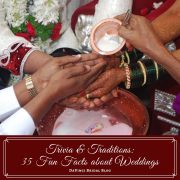Your Wedding Venue: Top 10 Crucial Questions to Ask Before Booking
At long last he asked, and you said yes, and now you’re ready to start pulling together your wedding plans. Let’s say you’ve done enough research that you’ve narrowed down your top choices, so the grueling search for the perfect wedding venue is coming to a close. Now all you need to do is show up to the appointment, meet your venue coordinator, take a tour of the place and ask questions. Lots and lots of questions.
Most couples, once they see the venue, picture the ceremony or reception in their minds, stick to that vision, and let their coordinator do the rest. However, sometimes a few weeks before the wedding, things don’t seem to be falling into place. Maybe they forgot the pitfalls of the season, failing to foresee weather changes. Maybe the size of the venue suddenly feels crowded because of a few extra guests. Even something simple, like not having enough space for your candy buffet, can turn what seemed to be the perfect place into a total planning disaster.
What’s the answer? Arm yourself with our Top 10 Crucial Questions and take them to your very first site visit.
GOOD NEWS: This is one task your groom-to-be may actually be happy to do!
Graphicstock.com
If you’re prepared, at that very first visit, you can ask all of your venue questions. Make a point to run down the list of what you’re looking for and ask the venue coordinator to address each issue, detail, or concern. Once you see our list, you’ll probably come up with more questions on your own, but this should be a pretty good place to start:
- What’s the availability of your venue? Time? Date?
Possibly the most essential thing you need to ask about is the availability of this particular venue on your wedding day. We know this sounds obvious, but occasionally it happens. If you have perfect answers to every single question, but “is this space available” isn’t one of them, your wedding plans will seriously come tumbling down. The specific dates and precise time availability of the venue affects everything: Time to transport and prep for the ceremony, weather conditions especially if your wedding is outdoors, or how far the reception will be from the ceremony site if you’ll have the ceremony and reception in separate places. Your entire wedding pretty much hinges on your venue.
Something to Consider: It’s not just outdoor weddings and receptions that need to factor in weather. For instance, if there’s a considerable walk from the parking lot to the entrance of the venue – which is very common when it comes to hotels and multi-room banquet halls – what will you need to do to help your guests warm up or dry off if it’s raining or snowing?
- How many hours are included in the rental rate?
Once you’re set with the date, you need to ask exactly how long you can rent the space. Some venues book as many as three different celebrations in one day – not necessarily three weddings – but maybe a business brunch or lunch, an afternoon party with trimmings and decorations such as a larger bridal shower, or a religious celebration like a confirmation party or a bar or bat mitzvah. Depending on how much time each type of booking is allowed, you may have only 3 or 4 hours if yours is an afternoon reception, or not be able to get in and decorate until the previous group leaves, and then you’ll need to be out by the venue’s designated closing time.
If you’re the first to ask, you will most likely be able to get what you want timewise. But if you don’t book that venue that very day, someone else could walk in after you and snag the time you wanted. It’s not uncommon for a church wedding – one that was “scheduled” for a certain Saturday but without a firm time commitment – to get bumped from a nice, relaxed late afternoon start time to 1 p.m. (and you’d better be out of there by 3, thank you) just because somebody else made up their mind sooner. This can also happen with a reception venue.
Ask how much time you have to set up and clean up, and what if anything the venue will do, either as part of the package price or to layer into the overall cost of the package. It generally takes about 2 hours to set up, and 2 hours to break down the tables, etc. and clean up. Keep that in mind as you review your overall wedding timing game plan, trying to calculate what services would be involved if you used the venue’s vendors or brought in your own.
- Is there a venue facilitator? If so, will he or she be there on the actually wedding day?
The venue facilitator generally oversees all the operations regarding the venue. He or she will know everything about the amenities, equipment, and various other things involved with their venue. It’s their job to make sure that all the necessary preparations are executed smoothly, everything from transporting equipment from the parking lot to the ceremony/reception location, the lighting setup and the decorations. If you have your own wedding planner, the venue facilitator will coordinate with your person. Someone has to be in charge because there’s no way for you to know everything that’s going on while you’re busy getting married. If anything goes wrong – defective lights, a leaking ceiling, too few chairs – the venue facilitator is your point person and will find a solution.
Important note: Not all venues have on-staff coordinators, and the overseer role may not be automatically included in the package, so you might have to pay a premium. This is one time that you should probably be willing to pay for whatever the venue wants for their coordinator. It’s much less hassle to have a paid professional rather than someone coming up to you personally because the lights aren’t working, or the restrooms weren’t stocked with toilet paper before you arrived (and yes, that’s happened).
- What accommodations are there for your setup people? Is there a loading dock or elevator? Are there specific entry and exit points?
These are key factors for your other wedding vendors, and what you can, and cannot have, may simply depend upon access. You can’t have a 6-foot ice sculpture as the centerpiece for your reception if the deliverymen can’t get it through the doorway! Other considerations are just as practical. For instance, a very chic place to have a cocktail reception is on the roof of a classy building, but if there’s no elevator, service or otherwise, it’s unlikely you’ll be able to find any caterer to work for you. Ask the venue manager where all the entry and exits points are and what they consist of e.g. loading docks and whether there is limited backup room for delivery trucks. Whatever you know ahead of time will help your other vendors either carry out your original vision or help you make some decisions regarding compromises.
- What lighting is included?
Good lighting is essential to create the mood of your reception, but it’s also important that people be able to see to get around. Most venues have “practical” lighting as in decorative wall sconces or chandeliers, and many times these are on dimmer switches. For any other unusual effects, like strobe lights or up-lights (small lights placed on the ground that shine upwards and cast an interesting shadow, often a potted fern), some venues offer those in the package or a la carte, while others have nothing out of the ordinary. Additionally, make sure you know what limitations that venue has on special effects. There also may be a logistical problem as in not enough outlets for plugs and such.
- What are the restrictions on volume and décor?
Some venues are more flexible than others when it comes to hanging decorations, custom backdrops, lighted dance floors, and anything that is temporarily installed then taken away after your wedding. A few have all these options and more already available, and you only need to determine how much you want to spend (most of these extras aren’t included in a package price). Truly extraordinary extras like fireworks displays may either be out of the question or may require a special permit from the fire department or other authority (and usually permits come with a fee, some more costly than others).
The other standard consideration is volume control. If you want to end your wedding with your DJ pretty much knocking the walls down with his speakers cranked, make sure the venue won’t get sued by the neighbors!
Conversely, if you want a quiet cocktail party with a string quartet, you don’t want to have to tolerate the DJ from the party next door reverberating on the adjacent wall.
- Where are the nearest facilities?
If you’re equally in love with two different locations, book the venue with the closest restrooms. (Yes, it’s that important.) Find out exactly how many there are and the exact walking distance from your main event room. Find out if you’ll need signs to direct your guests, or if the venue already has signs or will provide them (at no cost, too). Whatever the case, you might blush when you bring it up, but it’s essential, so you absolutely must ask.
- What exactly is included with this venue rate?
Before signing any contract, or even getting your heart too set on a location, make sure you know what is – and what is not – included in the package you’re considering. The last thing you need is to find out, months after the closing the deal, is that you have to pay fees that weren’t stipulated in the original contract. Ask how many tables and chairs it includes – and what it’ll cost you if you need a few more – what equipment is at your disposal, what basic styling is provided, if the package includes a cake or simple table decorations, perhaps one rose in a small vase in the middle of each table. Ask if there are separate fees for cleanup, insurance, or other necessities, or if it’s all-inclusive Every location has their own set of rules and arrangements, and before you book, you really do have to know what you’re paying for.
- What’s the cancelation policy?
You may need to cancel due to some unforeseen event, or maybe you’ll find a better venue down the road. Ask what percentage, if any, is refundable. Some down payments are not. Other venues allow you to pay over time, so depending on when you back out, that determines how much money you forfeit. Be sure to find out the details on cancelation fines, right down to the – rather your – last penny.
- What’s the venue’s backup plan?
Every plan must have a backup plan. There are some things you just can’t control, and if something goes wrong with your wedding venue, you need to know what they can – and will – do about it. Let’s say it’s a garden wedding. You expected the weather to be sunny. A day before your ceremony, Mother Nature decides to make it rain. Hard. Will your venue provide tents or another area with a closed roof? What can they offer and still come close to your original vision? The bottom line is that the venue must provide any services or materials that can serve as damage control if the need arises.
Now – take this list and go ask some questions!










Recent Comments